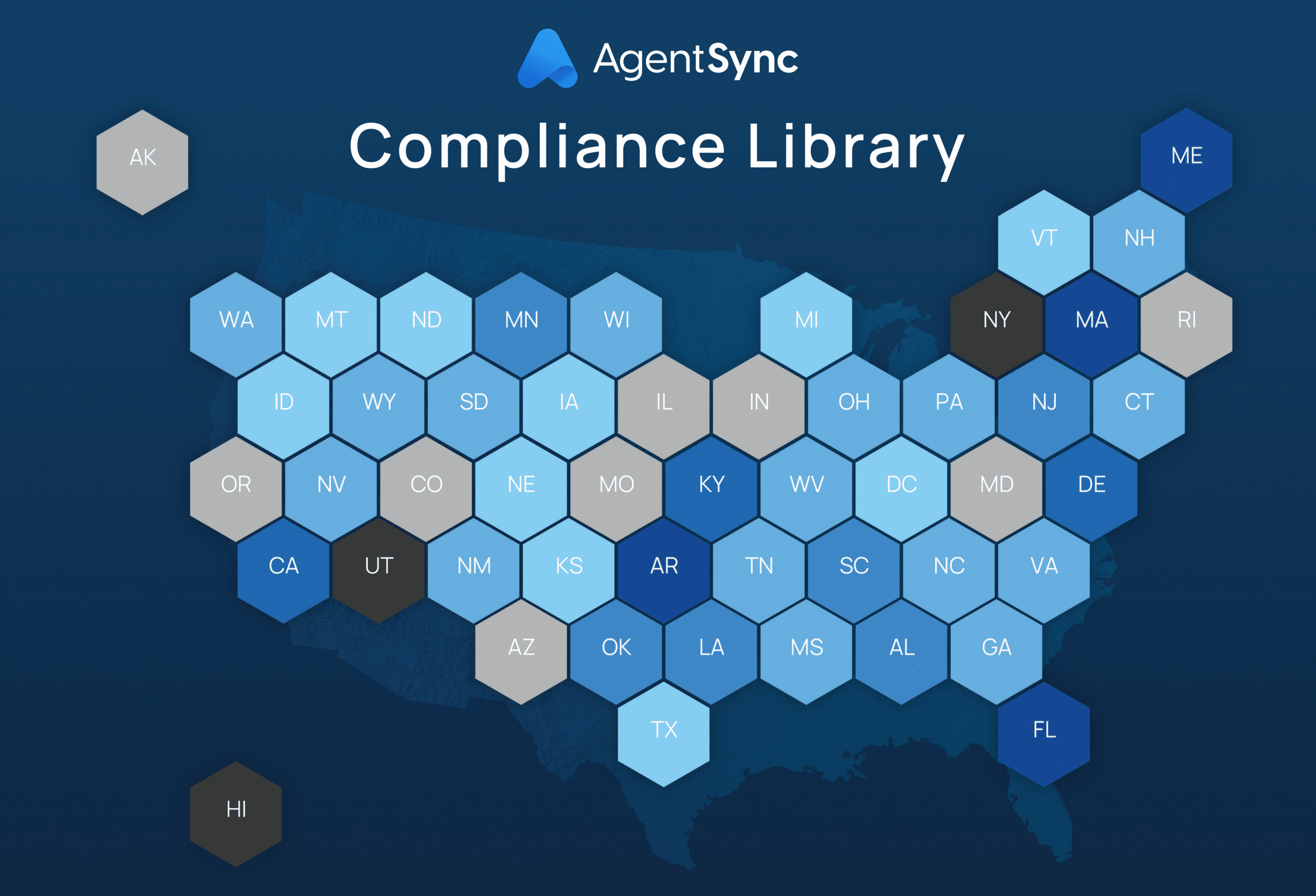

State-by-state variations of laws, compliance protocols, industry transparency, and general regulatory culture can lend one the impression that keeping up with industry changes is a little bit like herding cats. So, what better way to wrangle some of the more localized insurance news than in a Regulatory Roundup?
On an ongoing basis, in no particular order or rank, we’re wrestling the various regulatory changes, compliance actions, and commissioner decisions into our roundup. As a disclaimer: There’s a lot going on at any given time in these here United States, so this isn’t a comprehensive picture of state-level action by any means. Think of it, instead, as a sampler platter of regulation.
Also important to note: If we’re recapping interpretations of legal decisions, this is some armchair insurance speculation and not at all legal advice. If you need legal advice, get a lawyer.
Hurricane Helene puts several states into “disaster” territory
Hurricane Helene touched land on Sept. 26, 2024 and was the deadliest hurricane to hit the mainland U.S. since Katrina, and the fourth deadliest since 1950. Hurricane Helene was also notable for the vast amount of land it covered, wreaking havoc across Florida, Georgia, North Carolina, South Carolina, and Tennessee and Virginia – at which point it had weakened to a tropical storm.
In response to the hurricane, several states have declared states of emergency, which come with unique insurance ramifications, namely, allowing adjusters to work in the state without the usual resident license.
Florida: Effective Sept. 24, 2024, Florida declared a state of emergency due to Hurricane Helene and also issued guidance on its branch filing requirements during a state of emergency pertaining to the need to use a temporary location when filing. For consumers, Florida also took action to prohibit policy cancellations and nonrenewals to policyholders impacted by the hurricane.
Georgia: Effective Sept. 24, 2024, Governor Brian Kemp issued a state of emergency, which triggers adjusters’ ability to request emergency adjuster status for Georgia Registered Staff Adjusters, Out-of-State Staff Adjusters, or Out-of-State Licensees.
North Carolina: Effective Sept. 30, 2024, and continuing for 60 days, North Carolina will permit nonresident adjusters and motor vehicle damage appraisers to handle claims.
South Carolina: Effective Sept. 25, 2024, and continuing for 120 days, South Carolina will permit nonresident adjusters or motor vehicle physical damage appraisers to handle adjustments without holding a South Carolina license.
Tennessee: Effective Sept. 30, 2024, Tennessee is allowing nonresident insurance professionals who hold licenses in other states to request permission to engage in their practice in the state because of severe weather and flooding.
Former broker convicted of 90 counts of insurance fraud
How many times do we have to say it? Insurance fraud doesn’t pay! Even though it might seem like an attractive money-making scheme, insurance regulators are very skilled at spotting brokers, agents, and producers in the midst of fraudulent activities.
In the most recent example of a major insurance fraud bust, 56 year old (former) insurance agent Marie Dondanville, of Mission Viejo, California, pleaded guilty to 90 counts including:
- Grand theft
- Insurance fraud
- Elder abuse
- Forgery
Dondanville scammed 32 insurance clients over the course of eight years, stealing nearly $200,000 in insurance premiums from said clients. Her criminal activities included several varieties of fraud, such as overbilling for policy premiums and pocketing the money instead of paying the insurer. This meant her clients weren’t even insured despite paying her several times the actual cost of their supposed policies.
We have a feeling this agent won’t ever be able to get her license reinstated, in California or any other state. But if you’re wondering how you might be able to get into, or back into, the business of insurance with a rap sheet that’s not quite so egregious, check out our guide to renewing your insurance license with a criminal background.
California governor signs six new insurance bills into law
In a major win for the California Department of Insurance as well as consumers, California Gov. Gavin Newsom signed six new bills into law during this legislative session. These bills, sponsored by California Insurance Commissioner Ricardo Lara, aim to improve protections for vulnerable populations in the state.
Senate Bill 729 mandates insurance coverage for fertility and infertility care under large group health plans and disability insurance policies. It also updates the definition of infertility to include LGBTQ+ family planning, even if federal laws try to limit coverage for these populations.
Assembly Bill 2258 ensures all Californians can access affordable preventive care services without cost-sharing. The law specifically includes mandatory coverage for reproductive healthcare like contraception, HIV prevention, and screenings for HIV and other sexually transmitted infections (STIs).
Senate Bill 990 makes changes to the California State Emergency Plan to help ensure local government and non-government organizations are utilizing best practices when serving LGBTQ+ populations during an emergency or natural disaster, because data shows these populations are more likely to face homelessness or negative health consequences after a disaster.
Senate Bill 263 protects all Californians, particularly seniors, from the harmful impacts of being sold annuities that aren’t appropriate for their situations. In adopting the NAIC Suitability in Annuity Transactions Model Regulation, California adds consumer protections to hold insurance companies and licensed producers to the highest standards of conduct when they sell annuities.
Assembly Bill 2780 adds protections for immigrants arriving to the state with new requirements for commercial passenger transportation carrying 10 or more vulnerable passengers.
Senate Bill 577 makes changes and updates to the insurance code to clarify existing laws and remove obsolete sections of the code.
Other state regulatory changes
Arkansas is considering making it easier and quicker for military service members, veterans, and their spouses to become licensed insurance agents. The Insurance Department will hold a public heading in late October, and we’ll report back with the outcome, once available.
Florida is adding new rules for the filing of surplus lines forms, effective Sept. 10, 2024. Moving forward, each surplus lines agent who’s subject to paying the premium tax must provide discounts for certain policies with an effective date between Oct. 1, 2024 and Sept. 30, 2025, and must file information regarding these deductions on a quarterly basis.
Idaho has implemented new transaction types for processing Designated Responsible Licensed Producers (DRLP). This went into effect Sept. 17, 2024.
Illinois announced that its company appointment renewal season begins Nov. 5, 2024 and runs until Jan. 2, 2025. This year’s appointment renewal fee will be $50 for both resident and nonresident producers. Don’t forget you can save that money by using AgentSync for Just-in-Time Appointments to only pay for producers who’re producing!
Louisiana is among the 47 states (as of September, 2024) now using the Best Interest Annuity Standards which means producers need to complete annual annuity training to learn and uphold these new standards. The state also announced its appointment renewal period begins Nov. 27, 2024 and runs through Jan. 2, 2025 with a fee of $20 per renewal.
Maine will be implementing new transaction types to process Individual and Business Entity Primary Name Updates. This takes effect on Nov. 15, 2024.
New Jersey implemented new transaction types to process Designated Responsible Licensed Producer (DRLP) and Name Change (Demographics) updates, as of Sept. 13, 2024.
New Mexico announced insurance company appointment renewal invoices will be available for payment from Jan. 23, 2025 – April 30, 2025. Renewal fees will be $20 per appointment, and the termination deadline is Dec. 27, 2024.
North Dakota is going paperless! As digital transformation connoisseurs, we love to see that! Beginning Nov. 1, 2024, all correspondence from the North Dakota Licensing Division will be sent via email. Also in the state, effective Oct. 4, 2024, North Dakota will implement new transaction types to process DRLPs.
Oklahoma is another state with insurance company appointment renewal season upon us. The state announced that invoices will be available for payment from Nov. 25, 2024 – Jan. 2, 2025. The termination deadline is November 15, 2024 for appointments you don’t want to renew.
Washington is adopting some big changes, all taking effect on Nov. 4, 2024. These changes include: simplifying the licensing process for limited-line credit insurance, simplifying the fee structure for producers who cancel their licenses, removing outdated language that made crop adjusters exempt from CE requirements, removing references to pre-licensing education, and removing references to specific dates for electronic submissions since all licensing processes are now fully electronic. A “concise explanatory statement” is available online from the office of the Washington Insurance Commissioner.
Wisconsin has announced dates and fees for insurance appointments and terminations. The state’s renewal dates are Jan. 6, 2025 through March 15, 2024 with a termination deadline of Dec. 31, 2024. Wisconsin’s appointment renewal fees are $16 for residents and $30 for nonresidents.
Wyoming issued a memo to all surplus lines insurers doing business in the state and is now asking for additional information on non-admitted insurance written in 2024 and beyond. Effective Sept. 16, 2024. Surplus lines brokers that transact business with non-admitted insurers where Wyoming is the home state are required to file tax reports with the Wyoming Department of Insurance through the Surplus Lines Information Portal (SLIP).
While these points of interest aren’t comprehensive, our knowledge of insurance producer and variable lines broker license and compliance maintenance is. See how AgentSync can help make you look smarter today; head over to the Compliance Library and wrastle up some state-by-state regulation and more jurisdictional updates.

